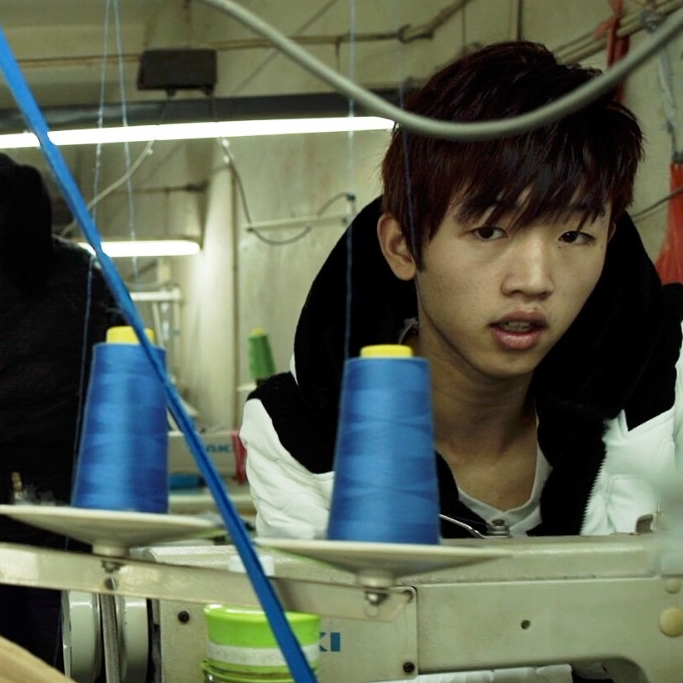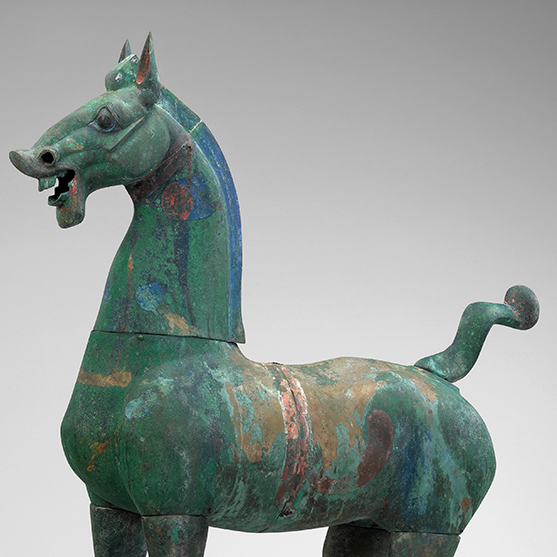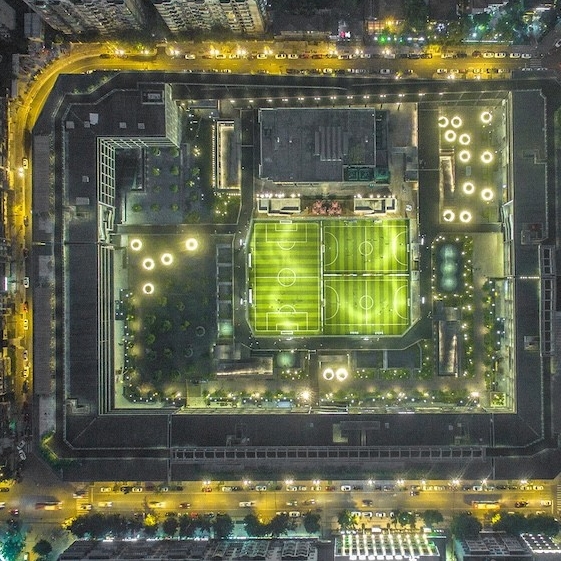 Chen Chieh-Jen, Worn Away, 2022-23, production photo: Chen You-wei, Courtesy Chen Chieh-jen Studio
Chen Chieh-Jen, Worn Away, 2022-23, production photo: Chen You-wei, Courtesy Chen Chieh-jen Studio
In this world
Consisting of only the System
And with no world beyond it,
We will all ultimately
Become discarded people.
The only difference
Is whether we are on this side of the wall
Or on that side,
Or perhaps inside the Holding Zone
Waiting to be deleted.
Inner monologue of the film’s protagonist, quoted from Chen’s concept notes for Worn Away.
A long-time denizen of Taiwan’s art world, Chen Chieh-jen’s work from the 1980s to the present has been exhibited internationally. To the local scene, he became renowned for Dysfunction No. 3, an interventionist performance on Taipei’s streets in the early 1980s. Wandering along dressed as hooded inmates, Chen and his contemporaries rejoinded government control through civil disobedience, forging a public sphere during times of oppression. In Chen’s multifaceted work, the Japanese rule over Taiwan in the first half of the 20th century, the country’s kinship with the US during the Cold War, and its present-day neoliberalization feature as periodic points of departure.
Turning to photography and, notably, filmmaking in the mid-1990s, the artist has since inquired into forms of colonization, mechanisms of marginalization, labor exploitation, and the multifarious blatant and covert forms of state control. To Chen’s filmic work, the particularity of sites–both actual spaces and staged ones–is essential. For instance, in his video work Empire’s Borders I (2008–09), a restaged office serves as a backdrop for an all-female cast to reenact humiliation practices at travel visa interviews. Through his projects, the artist has continuously collaborated with communities, including sanatorium residents, laid-off factory workers, migrants, and Chinese spouses. Engaging in community-making, Chen’s work probes forms of collective resistance, as much as it scrutinizes Taiwan’s entanglements in a globalized world order under the auspices of neoliberalism.
In his most recent film Worn Away (2022–23), part of the long-term project Her and Her Children, Chen paints a dystopian picture of a society living and suffering under the neoliberal regime of multinational corporations in a so-called “Corporatocracy”*: A globally operating “Empire” controls the Internet and thus sets the tone in propagating meritocracy as a universal model. While the distribution of wealth and well-being becomes more and more unequal, surveillance technologies and control mechanisms are omnipresent, very much along Orwellian lines, with corresponding consequences: More and more people who are unemployed, mentally ill, uncreditworthy, or who dissent from mainstream opinion face exclusion from society. Deprived of their human dignity and against the backdrop of their impending social extinction, they turn to the so-called “Optimization of Biological Function Assistance Program” run by the ruling companies and are henceforth considered nothing more than “material” for scientific experiments. The system has the interpretational sovereignty over the genuineness or falseness of information and thus the mechanisms for manipulating the masses in its hands. Trapped in the labyrinthine spaces of disorientation created by the system, it is becoming increasingly impossible for a majority of people to distinguish between reality and manipulation, and right and wrong, and thus to retain their critical faculties. In the face of total exploitation, a fatal situation.
As an artist who is aware of the power of images and of his responsibility as a filmmaker, Chen Chieh-jen consciously counters this bleak scenario with a number of structural, creative and content-related decisions and shows alternative patterns of action to the maxims of neoliberalism postulated in his film narrative. For example, by making the production of the film inclusive: the protagonists of his film represent precisely those groups of people – unemployed workers, migrants, the mentally ill – who are considered worthless in the film narrative (as in reality) and are pushed to the margins of society. With his diverse film cast, however, Chen gives these groups a platform, a voice, visibility. With the inner monologues of the protagonists, who are full of doubts about the system and report on its practices of manipulation and treatment of the outcasts, the director succeeds in reinterpreting the narrative of the “Empire” and deconstructing the illusion of a splendid future. To do this, he borrows from the historical-cultural approach to illusion and deception, from Eastern philosophy and religion, especially the Buddhist concept of Maya, which encompasses the entire world of appearances – reality and illusion – and holds the potential to establish an antithesis, the equality of all beings.
* The term “corporatocracy” describes a system or society in which corporations have economic, political, and often judicial control. In his concept paper, Chen cites transnational financial conglomerates, military industrial complexes, and digital and biotech giants as examples of companies involved.
About the Exhibition
Dates: June 30–September 3, 2023
Venue: Secession
Address: Friedrichstraße 12, 1010 Vienna, Austria
Courtesy of Secession.




























